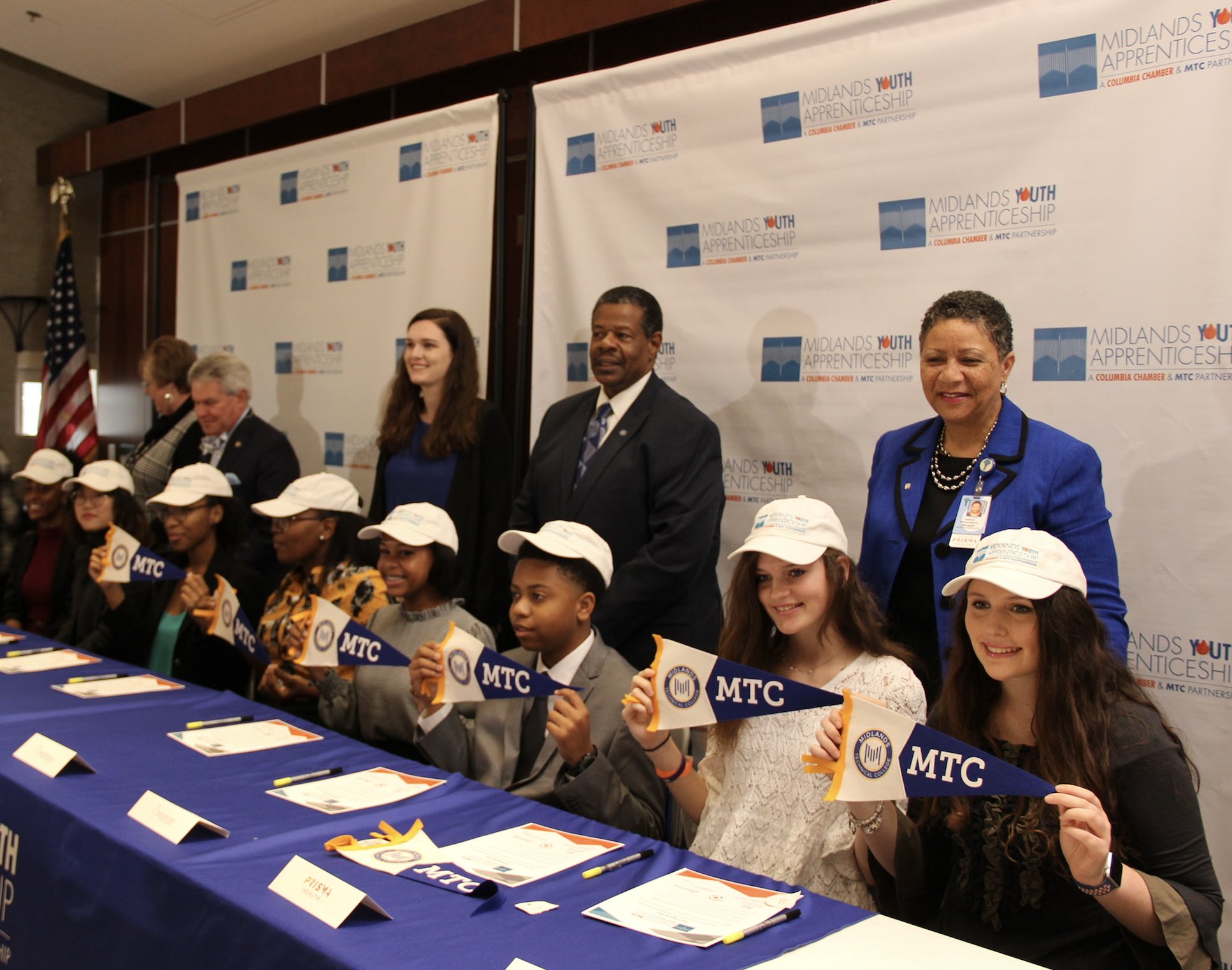Midlands Youth Apprenticeship Program

Earn real experience and a paycheck before graduating from high school.
The Midlands Youth Apprenticeship Program, a partnership with the Columbia Chamber, MTC, Apprenticeship Carolina, and participating Midlands school districts and employers, is a career-education pathway that helps build a viable, local workforce for high-demand, hard-to-fill positions.
It provides high school juniors and seniors the opportunity to get paid to learn as youth apprentices. Youth apprentices receive paid on-the-job training along with job-related education at MTC. The MYA Program also provides businesses and organizations the unique chance to meet qualified high-school students from a variety of fields and backgrounds who are already achieving at a high-level.
MTC has 10 different pathways in four Schools of Study for students to choose from in our apprenticeship program. To view all the pathways available to you, click here.
Contact
For more information on Dual Enrollment Pathways and how to apply, please contact Spencer Griffin at griffins@midlandstech.edu or 803.732.5337.
For more information on
QuickJobs Pathways and how to apply,
please contact Kate Wong at 803.691.3907.
Learn more
- Watch a virtual MYA information session
Click here to view a recorded virtual information session (passcode: MF0W+^b5).
Academic Dual Enrollment Pathways
- CNA/Nursing Dual Enrollment Pathway
- About the Program – The CNA/Nursing Pathway will provide a foundation in healthcare careers, communication, soft skills, computers, and anatomy and physiology. Students will develop basic nursing skills required of nursing assistants in skilled healthcare settings, such as activity of daily living, vital signs, eating, elimination, and safety measures. Instructional methods will be varied including classroom, online/hybrid, simulation/virtual reality, and clinical rotations. Skills taught in this program are those listed as required for the National Nurse Aide Assessment Program (NNAAP) Examination. Successful completion of this exam, along with listing on the South Carolina Nurse Aide Registry, is required to work as a Certified Nursing Aide in South Carolina.
Employment opportunities in South Carolina include positions in places such as hospitals, skilled nursing home facilities, long-term care facilities, hospice, and home healthcare. Related careers include patient care technicians, personal care aides, and rehabilitation aides/assitants.
Students must receive a grade of "C" or better on all CNA/Nursing Pathway courses. Students must pass a final comprehensive exit examination to graduate from the program. Students may not repeat CNA/Nursing Pathway courses more than once, nor may that progress to the next semester until that course is passed. Students may repeat only two CNA/Nursing Pathway courses.
Students will rotate through extended care facilities, hospitals, and clinics in the MTC service area for practical experience in Nursing Assisting. Students will be required to comply with regulations required by off-campus clinical sites, which might include fingerprinting, background checks, and drug screenings. - Admissions Criteria – In addition to the college's placement test and the specific admissions requirements for the Health Sciences department, specific interview eligibility criteria for the CNA/Nursing Pathway program include:
- Satisfactory compliance with required medical, physical, and immunization requirements
- Signed commitment contract
- Entrance Requirements
- Acceptable placement test score(s): ACCUPLACER
- Reading: 250
- Arithmetic: 250
- QAS: 250
- AAF: 200
- Current High School Apprenticeship Student
- Note: Students will need to meet additional entrance requirements to take nursing coursework if moving forward with the MTC Nursing program at the completion of the youth apprenticeship.
- Acceptable placement test score(s): ACCUPLACER
- Other Recommendations
- High school or college credits in math/science (algebra, biology, chemistry)
- Computer skills/keyboarding skills
- Courses
- Junior Year
- Fall
- COL 106
- ENG 101
- ART 101
- Spring
- MAT 120
- ENG 102
- Fall
- Senior Year
- Fall
- BIO 210
- PSY 201
- Spring
- BIO 211
- PSY 203
- Fall
- Junior Year
*Individual classes and semester schedules are subject to changes
- About the Program – The CNA/Nursing Pathway will provide a foundation in healthcare careers, communication, soft skills, computers, and anatomy and physiology. Students will develop basic nursing skills required of nursing assistants in skilled healthcare settings, such as activity of daily living, vital signs, eating, elimination, and safety measures. Instructional methods will be varied including classroom, online/hybrid, simulation/virtual reality, and clinical rotations. Skills taught in this program are those listed as required for the National Nurse Aide Assessment Program (NNAAP) Examination. Successful completion of this exam, along with listing on the South Carolina Nurse Aide Registry, is required to work as a Certified Nursing Aide in South Carolina.
- Pharmacy Technician Dual Enrollment Pathway
- About the Program – The Community Pharmacy Technician Certificate provides pharmacy technician training with an application to community practice. The program teaches students proper pharmacy operations under the supervision of registered pharmacists. The curriculum combines classroom, online, and experiential learning with duties carried out by the pharmacy technicians in preparing drugs, filling prescriptions, pricing, patient profiles, drug calculations, controlled substances, and other pharmacy-related activities.
Midlands Technical College is accredited for Pharmacy Technician training by the American Society of Health Systems Pharmacists.
American Society of Health Systems Pharmacists
7272 Wisconsin Avenue
Bethesda, Mayland 20814
(301) 657-3000
ashp.org - Admissions Criteria
- Satisfactory compliance with required medical, physical, and immunization requirements
- Signed commitment contract
- Entrance Requirements
- Acceptable placement test score(s): ACCUPLACER
- Reading: 250
- Arithmetic: 250
- QAS: 250
- AAF: 200
- Acceptable placement test score(s): ACCUPLACER
- Other Recommendations
- High school or college credits in mathematics/science (algebra, biology, chemistry)
- Computer skills/keyboarding skills
- Certificate – Community Pharmacy Technician (25 credits)
- Courses
- Junior Year
- Fall
- PHM 101
- PHM 110
- Spring
- PHM 113
- PHM 114
- Fall
- Senior Year
- Fall
- PHM 124
- PHM 152
- Spring
- PHM 164
- Fall
- Junior Year
*Individual classes and semester schedules are subject to changes
- About the Program – The Community Pharmacy Technician Certificate provides pharmacy technician training with an application to community practice. The program teaches students proper pharmacy operations under the supervision of registered pharmacists. The curriculum combines classroom, online, and experiential learning with duties carried out by the pharmacy technicians in preparing drugs, filling prescriptions, pricing, patient profiles, drug calculations, controlled substances, and other pharmacy-related activities.
- Mechatronics Dual Enrollment Pathway
- About the Program – Mechatronics Technology Certificate program prepares students to work in the highly automated manufacturing environment of the 21st century. The program is a good fit for students who desire a hands-on career and are technically inclined. Course topics include: AC/DC electricity, principles of manufacturing processes and production, print-reading/CAD, industrial safety, hydraulics and pneumatics, programmable controllers, motors, basic principles of mechanics, sensors, and machine tool basics.
- Admissions Requirements
- ACCUPLACER
- Reading: 250
- Arithmetic: 250
- QAS: 250
- AAF: 200
- ACCUPLACER
- Courses
- Junior Year
- Fall
- COL 101
- ENG 160
- MAT 170
- Spring
- IMT 108
- IMT 112
- Fall
- Senior Year
- Fall
- EEM 117
- IMT 214
- Spring
- EEM 251
- IMT 131
- IMT 107
- Fall
- Junior Year
*Individual classes and semester schedules are subject to changes
QuickJobs Pathways
- Emergency Medical Technician (EMT) QuickJobs Pathway
- About the Program – This program is designed to prepare students for entry-level positions in hospitals, private ambulance services, local government agencies and some industrial settings.
- Skills/Abilities – Bending, standing, stooping, squatting, lifting, walking, driving and patient contact.
- Recommended WIN Scores
- Reading for Information: 3
- Locating Information: 3
- Applied Math: 3
- Where Employed – Emergency response organizations, private companies specializing in patient transport, some government agencies.
- Job Duties – Provide emergency care to patients in need. They may also be required to drive ambulances and/or other transport vehicles as well as participate in additional emergency options.
- Associated Certifications – National Certification Exam (NREMT)
- Prerequisites
- Background check – Only before taking National Registry.
- Must be 18 years of age – Before you can take National Registry.
- Equipment and Special Clothing – Black polo shirt (long or short sleeve), black khaki or cargo pants (no jeans), black leather shoes and black belt, CPR face shield with O2 port and pen light, pocket mask with O2 inlet. Watch with second hand.
- Duration – 2 Semesters
- *Courses
- Semester 1
- Essential Skills/EMT Basic | 106 Class Hours (18 Essential Skills/ 88 EMT)
- Semester 2
- EMT Basic (continued) | 112 Class Hours
- Semester 1
*Individual classes and semester schedules are subject to changes
- Computer Technician QuickJobs Pathway
- About the Program – Train for a career repairing and maintaining computers and network servers in almost any small or large business or government entity. This program prepares you to obtain your CompTIA A+ and Network+ certifications, and puts you in the driver's seat toward becoming a successful help desk technician, computer support specialist, information technology specialist or network technician.
- Skills/Abilities – Good knowledge of computers.
- Recommended WIN Scores
- Reading for Information: 5
- Locating Information: 4
- Applied Math: 5
- Where Employed – Computer Technicians work in a variety of settings, encompassing both the public and private sectors.
- Job Duties – As a Computer Technician, you will answer user inquiries regarding computer software or hardware operation to resolve problems. You will also oversee the daily performance of computer systems, read technical manuals, confer with users, and conduct computer diagnostics to investigate and resolve problems or to provide technical assistance and support. You will set up equipment for employee use, performing or ensuring proper installation of cables, operating systems, or appropriate software. Computer Technicians also develop training materials and procedures, or train users in the proper use of hardware or software.
- Associated Certifications – CompTIA A+ and Network+
- Duration – 2 Semesters
- *Courses
- Semester 1
- A+ IT Technician | 60 Class Hours
- Semester 2
- Network+ | 60 Class Hours
- Semester 1
*Individual classes and semester schedules are subject to change.
Prospective Businesses and Partners (MYA Program)
With the Baby Boomer population on the verge of retiring, apprenticeships offer companies the opportunity to provide a roadmap to individuals seeking direction, mentoring, and the opportunity to be paid to learn a skill that allows them to assist companies in filling critically needed occupations. The internships and other opportunities offered to students through the Midlands Youth Apprenticeship Program can lead to early access and training for future employment.
Frequently Asked Questions By Employers
As the employing organization, there are substantial benefits, opportunities, and responsibilities attached to partnering with the MYA Program.
Talk to us about your employment needs!
MTC Business Solutions Office
Email: corporatetraining@midlandstech.edu
Phone: 803.691.3907
Quick Links to MYA Resources
Success Story
Nephron Pharmaceuticals
Lou Kennedy CEO and Co-Owner of Nephron Pharmaceuticals Group Nephron Pharmaceuticals partners with MTC to fill the jobs gap. "We recently opened a new greenfield facility just outside of Columbia, SC. Midlands Technical College was a major factor in determining our location choice."

